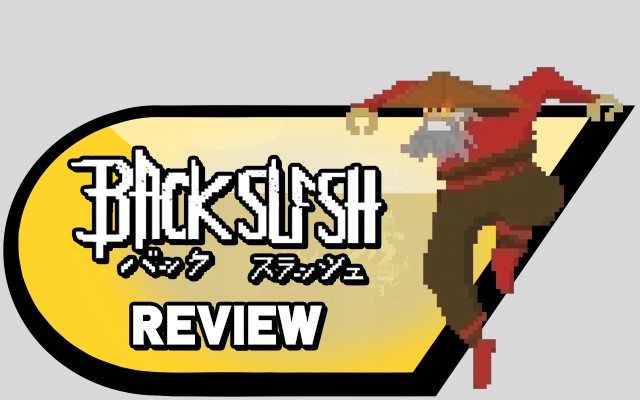
As gamers, we have we are lucky enough to be inundated with a vast assortment of game choices. From AAA releases to budget titles, it can be hard to find games that really resonate with you as a player. Today I’ll be reviewing BackSlash from Skeleton Crew Studios, a small indie fighter from Skeleton Crew Studios. Let’s see if this game might be a fit for you.
So what’s this about?
BackSlash is a simple fighting game with a retro aesthetic that involves a bit of platforming. That being said, I wouldn’t call it a platform fighter, per se. That terminology invokes images of a more Smash style game, which is something that this is not. The majority of BackSlash involves one versus one fighting, and the controls are very simple, with only three buttons really needed: one for jump, one for melee attack, and one for spells. Melee attacks can be done at any time and are your primary source of attack. Spells, by contrast, can only be used when your “fluid” meter maxes out. Fluid is a resource that auto-generates during play, but it builds faster when you are hitting your opponent with regular attacks. It also generates faster the longer a match goes on, so long matches may devolve into spell-fests.
The spells themselves are divided into 11 clans (character classes) that have their own strengths and weaknesses. A player can choose two clans for their character which then grants them access to random spells that clan during battle. These spells are, however, chosen at random and are once again only available at max fluid, which can lead to some interesting battle strategy. I, for instance, enjoyed using “Scorpio,“ a hard hitting style with some leech healing abilities with “Marsh Trackers,” a clan that uses many traps and includes an additional healing spell. The game’s overall feel harkens back to old kung-fu movies, and the plot (what little of it there is) seems to have a similar inspiration.
The game has local multiplayer and quick match (one on one versus the computer) as well as two single player modes. The first is a survival mode in which you retain health between rounds while you face an endless army of randomly generated foes. The second is “Quest Mode,” which mostly consists of one versus one fights against different opponents with a slight amount of back story as well as a few stages that involve platforming in way or another (with goals such as not being hit by arrows or traversing from one side of the stage to the other.) This all leads to the show down with Oji, a “polycaster” that I can say from personal experience, hit’s like a truck.
What does it do right?
This game is very easy to pick up and play. As mentioned above, the control scheme is simple, but the variety of spells give it a decent amount of depth. It should be noted that this game is controller compatible, and I would recommend that control method above any other. I played about 40 minutes of this game on the keyboard before I took out my Xbox One controller, and my enjoyment of the game was night and day. The sprite work is simple, but also very clean. The player sprites can come off as very plain, with the only real differences being unlockable colors (which cover the entire body) and different masks that correspond with the clan you are using. Clan choice also affects stats, melee attacks, and character animations. While the character looks are a bit on the bland side, some of the animation, especially at the beginning of matches, is quite nice.
The game has five stages that range from a moving train to an atrium. These stages are fully destructible, and destroying parts of the stage to create advantageous terrain is a legitimate strategy. In addition to this, chickens can be found in the walls, and a wise fighter will use this to regain health at critical times. BackSlash also has an in game currency that unlocks color variations and clans in game. It’s not much, but it does help in providing a sense of progression.
But is it good?
BackSlash is good at not being boring while also not feeling overly complicated. It’s certainly a unique game, but it also feels very bare bones. Once a player clears “Quest Mode” all that is left is survivor and quick match…and quick match is local play only. This might not be a big deal for some of you out there, but I very seldom do local co-op on my PC. That is reserved more for console play, and in a lot of ways, I feel an eventual console release of this game would be my preferred way to play. In addition to this, their is no customization for quick match versus the computer. No AI selector, no rules….buy at least you can choose your stage, I suppose. The music is good, but not particularly memorable. After nearly 7 hours of playing I can not remember one song. Overall, I enjoyed my time BackSlash, but I wouldn’t recommend it to everyone at it’s retail price of $14.99. If you have a setup that will allow you to play co-op on your PC and are a fan of unique fighters and enjoy retro experiences, though, this might be a game to consider.
- Spidersaurs (Nintendo Switch) Review - July 23, 2022
- Chrono Cross: The Radical Dreamers Edition (Switch) Review - June 11, 2022
- Big Brain Academy: Brain vs. Brain - January 18, 2022










